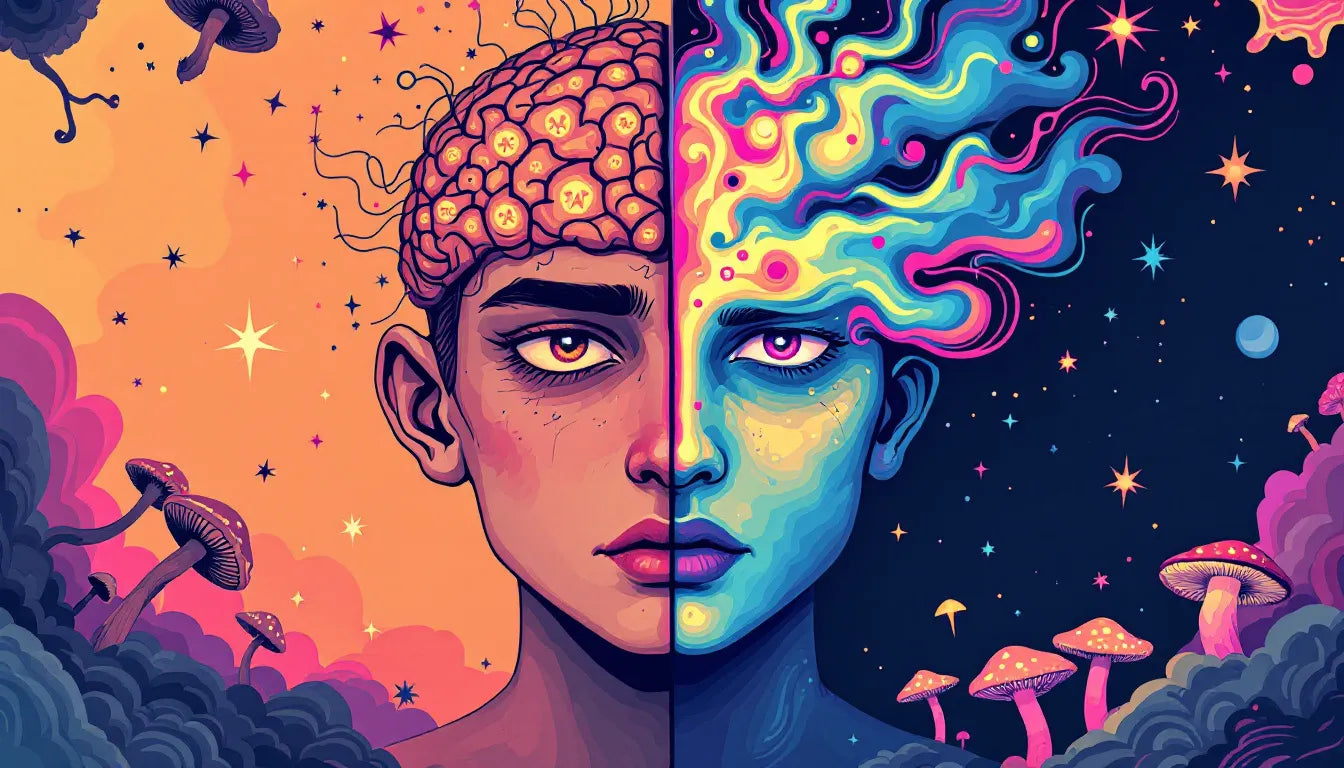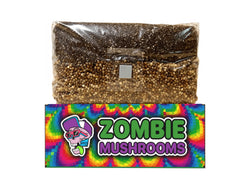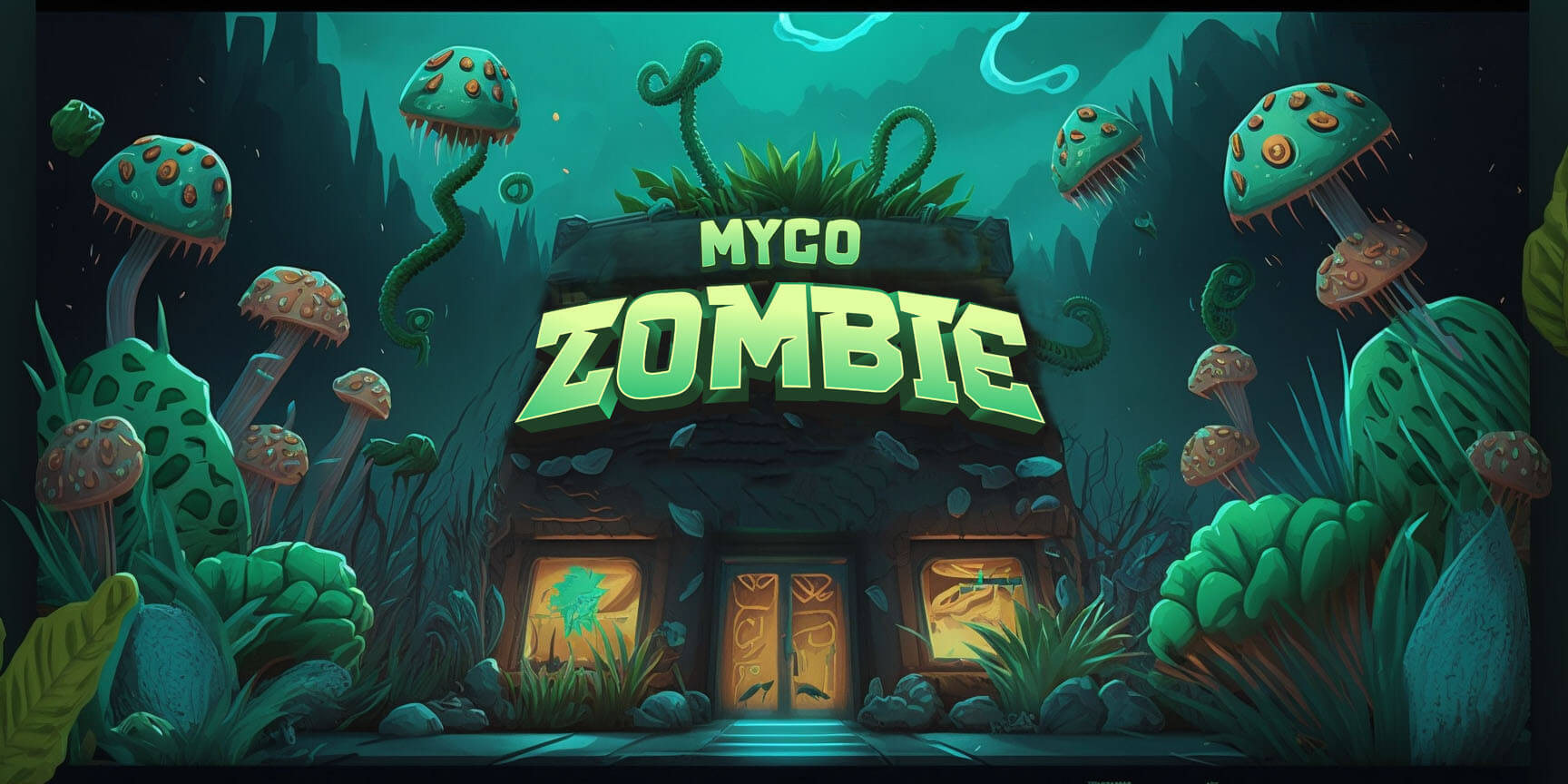- Sleep deprivation increases serotonin 2A receptor activity, affecting mood, perception, and cognitive function.
- People with schizophrenia may experience worsened symptoms due to heightened serotonin 2A receptor sensitivity.
- Psychedelic drugs like LSD and psilocybin target serotonin 2A receptors, suggesting potential overlaps with sleep deprivation effects.
- Chronic lack of sleep can cause emotional instability, memory deficits, and increased risk of psychiatric disorders.
- Natural supplements, including functional mushrooms, may help support serotonin balance and promote better sleep.
Understanding the Serotonin 2A Receptor
The serotonin 2A receptor (5-HT2A) is a crucial component of brain function, and its role extends far beyond simple neurotransmission. It is a primary receptor in the serotonergic system, which influences mood, cognition, and perception. More importantly, it has been heavily implicated in psychiatric disorders like schizophrenia, mood regulation, and the effects of psychedelic substances.
Key Functions of the Serotonin 2A Receptor
- Mood Regulation: 5-HT2A receptors are integral to emotions and are linked to both anxiety and depression when imbalanced.
- Perception & Cognition: These receptors can dramatically alter sensory perception, attention, and decision-making.
- Psychedelic Drug Interaction: Psychedelics, including LSD and psilocybin, activate serotonin 2A receptors, leading to altered states of consciousness.
- Schizophrenia Association: Changes in 5-HT2A activity have been observed in schizophrenia patients, linking the receptor to hallucinations and delusions.
Given its wide-ranging effects, understanding how sleep deprivation influences serotonin 2A receptor function is critical for both mental health and general cognitive performance.

Effects of Sleep Deprivation on Serotonin 2A Receptors
Sleep deprivation can rapidly alter serotonin 2A receptor activity, sometimes within just a few hours of lost sleep. Studies suggest that prolonged wakefulness increases serotonin 2A receptor sensitivity, leading to various neurological and psychological effects (Van Loon & Meeusen, 2020).
Primary Effects of Sleep Deprivation on 5-HT2A Activity
- Increased Emotional Sensitivity: Lack of sleep can significantly heighten emotional responses, making individuals more reactive to stress.
- Cognitive Distortions: Impaired serotonin function linked to sleep loss can cause distorted thinking, poor decision-making, and even false perceptions.
- Susceptibility to Hallucinations: An overactive serotonin 2A receptor, due to sleep deprivation, may contribute to hallucinations and paranoia, particularly in individuals with a predisposition to schizophrenia.
These findings suggest that for those already at risk for mental health disorders, sleep deprivation could potentially act as a trigger for exacerbated symptoms.

Schizophrenia and the Serotonin 2A Receptor
The Role of 5-HT2A in Schizophrenia
Schizophrenia is a complex disorder often associated with dopamine dysfunction, but the serotonin 2A receptor also plays a significant role. Studies show that overactivity of this receptor is linked to hallucinations and delusions, two hallmark symptoms of schizophrenia.
- Antipsychotic Medications & 5-HT2A: Many modern antipsychotic drugs, such as clozapine and risperidone, work by blocking serotonin 2A receptors to reduce hallucinations and psychosis.
- Sleep Deprivation as a Risk Factor: Since lack of sleep enhances serotonin 2A receptor activity, individuals with schizophrenia—or those at risk—may experience exacerbated symptoms after sleep loss.
- Sensory Processing Changes: Schizophrenia patients often struggle with misinterpreting sensory signals, and enhanced serotonin 2A receptor activity may further dysregulate perception.
These insights suggest that prioritizing sleep could be a critical factor in schizophrenia symptom management and should not be overlooked.

Serotonin 2A Receptors and Psychedelic Drugs
Serotonin 2A receptors are widely known for their interaction with psychedelic substances such as
- LSD (Lysergic Acid Diethylamide)
- Psilocybin (Found in "Magic Mushrooms")
- DMT (Dimethyltryptamine, the active compound in Ayahuasca)
These substances bind directly to 5-HT2A receptors, causing profound sensory changes, emotional shifts, and altered cognition (Nichols, 2016). Research suggests that
- The hallucinatory effects of psychedelics closely mimic symptoms seen in schizophrenia, reinforcing the role of 5-HT2A in perception.
- A sensitized serotonin 2A receptor due to sleep deprivation may intensify psychedelic effects, raising concerns for those using these substances under sleep-deprived conditions.
- Some studies indicate that psychedelics could have therapeutic benefits for depression and PTSD, but more research is needed to determine how sleep quality influences their effects.
The overlap between serotonin 2A receptor activation, sleep deprivation, and altered perception is an important area of ongoing research.

Environmental Stressors and Rapid Brain Changes
External influences like sleep deprivation can dramatically alter brain chemistry in a very short time. Studies reveal that even one night of sleep loss disrupts serotonin levels, leading to emotional instability and cognitive difficulties (Brown et al., 2012).
Why Is the Brain So Sensitive to Sleep Loss?
- Serotonin helps regulate the body’s internal clock. Disrupting sleep can throw off this system, leading to mood swings and cognitive impairments.
- Neuroplasticity is affected. Chronic sleep deprivation reduces the brain’s ability to form new connections, impacting learning and memory.
- Stress hormones surge. Cortisol levels rise with sleep deprivation, contributing to anxiety, irritability, and physical health problems.
These findings emphasize the importance of keeping a stable sleep routine to support mental well-being.

Can Mushrooms and Natural Supplements Help Regulate Serotonin?
Some functional mushrooms and natural supplements may help support serotonin regulation and counteract sleep deprivation effects, including
Lion’s Mane (Hericium erinaceus)
- Boosts Nerve Growth Factor (NGF), promoting brain cell regeneration
- May improve memory and cognitive function while reducing anxiety
Reishi (Ganoderma lucidum)
- Reduces stress and enhances sleep quality
- May help balance serotonin function to combat sleep deprivation effects
Magnesium
- Crucial for neurotransmitter function and relaxation
- Low magnesium levels are associated with sleep disorders
Valerian Root & Herbal Teas
- Promote relaxation and improve sleep onset
- May have mild serotonin-modulating effects
While these supplements can offer support, prioritizing healthy sleep habits remains the best natural solution for serotonin balance.

Optimizing Sleep for Brain Health
To promote optimal serotonin function, consider adopting these sleep-enhancing habits
Maintain a Consistent Sleep Schedule: Going to bed and waking up at the same time each day can regulate circadian rhythms.
Limit Screen Time Before Bed: Blue light from devices disrupts melatonin production, making sleep harder to achieve.
Practice Relaxation Techniques: Meditation, deep breathing, or reading can help signal the brain to wind down.
Use Natural Sleep Aids: Magnesium, herbal teas, and adaptogenic mushrooms may promote relaxation without side effects.
By prioritizing good sleep hygiene, you help protect serotonin 2A receptor function, improve mental clarity, and reduce the risk of psychiatric complications.

Future Research on Sleep Deprivation, Psychedelics, and Schizophrenia
Ongoing studies seek to determine
- How sleep deprivation alters serotonin receptor sensitivity in the long term
- Potential therapeutic applications of psychedelics for treating schizophrenia
- New interventions to mitigate sleep loss effects on serotonin function
The growing interest in psychedelic medicine, sleep science, and mental health may pave the way for new treatment approaches for psychiatric disorders.
Final Thoughts
Sleep deprivation significantly influences serotonin 2A receptor activity, affecting mood, cognition, and psychiatric symptoms. Whether you're interested in mental health, psychedelic research, or optimizing brain function, quality sleep should be a top priority. Combining healthy sleep habits, natural supplements, and a strong understanding of serotonin regulation can help support overall well-being.
Citations
- Brown, R. E., Basheer, R., McKenna, J. T., Strecker, R. E., & McCarley, R. W. (2012). Control of sleep and wakefulness. Physiological Reviews, 92(3), 1087-1187. https://doi.org/10.1152/physrev.00032.2011
- Nichols, D. E. (2016). Psychedelics. Pharmacological Reviews, 68(2), 264-355. https://doi.org/10.1124/pr.115.011478
- Van Loon, L. J. C., & Meeusen, R. (2020). The impact of sleep deprivation on cognitive performance and neurochemical balance. European Journal of Applied Physiology, 120(3), 527-540. https://doi.org/10.1007/s00421-019-04297-4




